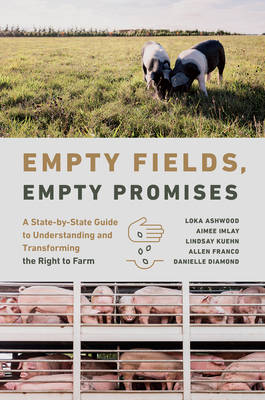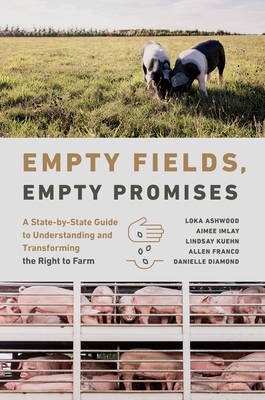
- Afhalen na 1 uur in een winkel met voorraad
- Gratis thuislevering in België vanaf € 30
- Ruim aanbod met 7 miljoen producten
- Afhalen na 1 uur in een winkel met voorraad
- Gratis thuislevering in België vanaf € 30
- Ruim aanbod met 7 miljoen producten
Zoeken
Empty Fields, Empty Promises
A State-By-State Guide to Understanding and Transforming the Right to Farm
Loka Ashwood, Aimee Imlay, Lindsay Kuehn, Allen Franco, Danielle Diamond
€ 38,45
+ 76 punten
Uitvoering
Omschrijving
The right to farm is essential to everyone's survival. Since the late 1970s, states across the nation have adopted so-called right-to-farm laws to limit nuisance suits loosely related to agriculture. But since their adoption, there has yet to be a comprehensive analysis of what these laws do and who they benefit. This book offers the first national analysis and guide to these laws. It reveals that they generally benefit the largest operators, like processing plants, while traditional farmers benefit the least. Disfavored most of all are those seeking to defend their homes and environment against multinational corporations that use right-to-farm laws to strip neighboring owners of their property rights. Through what the book calls the "midburden," right-to-farm laws dispossess the many in favor of the few, paving the path to rural poverty.
Empty Fields, Empty Promises summarizes every state's right-to-farm laws to help readers track and navigate their local and regional legal landscape. The book concludes by offering paths forward for a more distributed and democratic agrifood system that achieves agricultural, rural, and environmental justice.
Empty Fields, Empty Promises summarizes every state's right-to-farm laws to help readers track and navigate their local and regional legal landscape. The book concludes by offering paths forward for a more distributed and democratic agrifood system that achieves agricultural, rural, and environmental justice.
Specificaties
Betrokkenen
- Auteur(s):
- Uitgeverij:
Inhoud
- Aantal bladzijden:
- 304
- Taal:
- Engels
- Reeks:
Eigenschappen
- Productcode (EAN):
- 9781469674599
- Verschijningsdatum:
- 26/09/2023
- Uitvoering:
- Paperback
- Formaat:
- Trade paperback (VS)
- Afmetingen:
- 154 mm x 230 mm
- Gewicht:
- 204 g

Alleen bij Standaard Boekhandel
+ 76 punten op je klantenkaart van Standaard Boekhandel
Beoordelingen
We publiceren alleen reviews die voldoen aan de voorwaarden voor reviews. Bekijk onze voorwaarden voor reviews.











